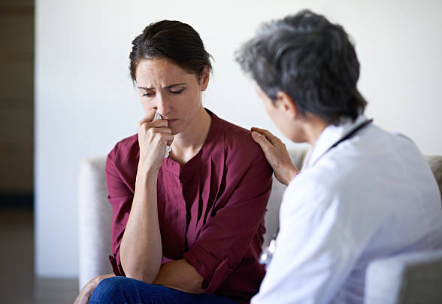Self-Help for Anxiety
Self-help for anxiety is an intervention that is used by people who are struggling with anxiety. There is some evidence that these interventions are effective. However, the research examining these interventions in adults is poor.

Selfpause Affirmation App
Download the app to get 1,000’s of affirmation meditations and everything you need to write, record and listen to your own.
Research on self-help for anxiety

This review examined self-help interventions for anxiety. Participants were recruited from Australia, New Zealand, Canada, USA, UK and Ireland. The research panel included clinicians, researchers, consumers and people with lived experience of anxiety. Experts with expertise in anxiety disorders and self-help methods were recruited. Experts needed to be well established in the field.
The researchers reviewed 71 published studies for strategies to combat anxiety. The strategies were classified according to how helpful they are for the sufferer. They were also rated based on their practicality for a person with moderate anxiety, including the amount of time, effort, and costs involved. Some strategies were rated highly, while others were not.
Although the effectiveness of self-help actions for anxiety is not well understood, there are several successful examples. For example, a Delphi study was conducted to identify evidence-based strategies for mild anxiety. It consulted consumers, professional experts, and health-care professionals to determine which self-help actions were feasible and which ones were ineffective. Those strategies that were proven to be effective could be marketed to the general public.
Self-help for anxiety is an important tool to overcome symptoms. Practicing certain strategies can make the symptoms go away faster. Other self-help strategies may involve taking a quiz to understand why you experience anxiety. Another helpful strategy is changing the physical environment. Changing the setting in which you perform anxiety-provoking activities can make a big difference in your life.
Despite the importance of these self-help interventions, research has not been rigorous enough to support their effectiveness in preventing anxiety disorders. However, the benefits of early intervention can help prevent anxiety from becoming more serious and widespread. Therefore, further research is essential. The results of such studies should be made public and should provide the evidence base for self-help for anxiety.
Limitations

Although anxiety disorders are highly prevalent and have a considerable economic impact, many people do not seek adequate treatment. Self-help interventions have been proposed as a low-cost, effective, and low-threshold treatment option. This article explores the benefits and limitations of guided self-help for anxiety and looks at the evidence base for its effectiveness. It also reviews the most common barriers to self-help for anxiety and provides recommendations for further research.
The research team systematically reviewed the scientific and lay literature to identify self-help strategies for anxiety. Then, the authors presented the strategies to a panel of experts in three sequential rounds. After each round, participants were given the chance to suggest new strategies to be rated in a subsequent round. The panel members then had the opportunity to maintain or change their ratings based on group feedback.
Researchers have found that many self-help strategies have shown positive results for people with mild anxiety and depression. However, the evidence is not conclusive as to which ones are most effective. The Delphi study, which included consumer and professional experts, aimed to identify the best self-help strategies for mild anxiety and depression. If successful, they could then be widely promoted to the general public.
The study results have been translated into a self-help guide for people with anxiety. The authors hope that it will empower individuals with mild anxiety and prevent them from relapsing with more severe forms of anxiety. However, it is important to note that self-help strategies should be promoted in conjunction with evidence-based treatment and prevention programs.
In addition to self-help for anxiety, many people experience less anxiety when they have a consistent daily schedule. This consistent schedule helps them establish a sense of security and predictability. For example, they can wake up at the same time each day and eat their breakfasts at the same time each day. They can also schedule their activities in similar time frames and include time for serenity and creativity.
Our Top FAQ's
To identify the causes of your anxiety, it can be helpful to keep a journal of your thoughts and emotions, as well as any triggers or situations that seem to increase your anxiety. You can also consider talking with a mental health professional, who can help you identify any underlying issues or patterns that may be contributing to your anxiety.
There are a variety of techniques that can be helpful for managing anxiety in the moment. Some options include deep breathing, progressive muscle relaxation, and mindfulness meditation. These techniques can help you focus your attention on the present moment and reduce your anxiety.
Changing your thought patterns can be an effective way to help reduce anxiety. This can involve identifying and challenging negative or distorted thoughts (also known as cognitive distortions), and replacing them with more realistic and helpful thoughts. A mental health professional can help you learn more about this process.
Lifestyle changes that may be helpful for improving anxiety symptoms include getting regular exercise, getting enough sleep, eating a healthy diet, and reducing stress through activities like yoga or tai chi. It can also be helpful to limit or eliminate your intake of alcohol and caffeine, which can contribute to anxiety.
If your anxiety is interfering with your daily life or causing significant distress, it may be helpful to seek professional help. Options for treatment include therapy, medication, or a combination of the two. A mental health professional can help you determine the best approach for your specific needs and goals.
